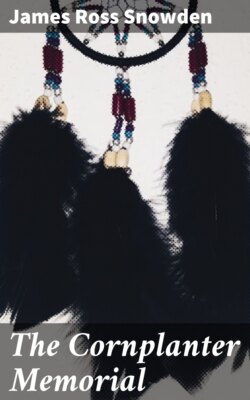Читать книгу The Cornplanter Memorial - James Ross Snowden - Страница 5
На сайте Литреса книга снята с продажи.
INTRODUCTORY REMARKS
OF
HON. S. P. JOHNSON.
ОглавлениеTable of Contents
Friends of Cornplanter and fellow citizens:
By a joint resolution of the Pennsylvania Legislature, approved by the Governor the 25th of January, 1866, the State Treasurer was directed to pay to me, the sum of five hundred dollars, "to be expended in erecting and enclosing a suitable monument to Cornplanter, as a recognition of his eminent services to the State during its early history."
This duty I have endeavored to perform, as well as the limited means at my disposal would permit. You have before you to-day, the result of that effort, which, for the price paid, is highly creditable to the State, the Chieftain, whose virtues it is intended to commemorate, and the architect who designed and executed it. It is befitting that the virtues and services of public benefactors should receive public recognition and be perpetuated by suitable memorials. There is much in the history of Cornplanter, after his alliance with the American government, to elicit admiration and secure the gratitude of this State and the nation.
Immediately upon the close of the Revolutionary war he became the fast friend of the white man and the government. Satisfied that his nation had been fraudulently decoyed into alliance with the British during the war, and basely betrayed by then allies at its close, he hastened to repair the wrong, by giving all his influence and energies to the inauguration of a peace between the United States and the Six Nations, of which he was then a distinguished Chief. Although resisted by all the craftiness of Brant, and the eloquence of Red Jacket, he persisted until his purpose was consummated by the treaties of Fort Stanwix and Fort Harmar, both of which were secured through and executed by himself. By them the Indian claims to most of the land in Western New York, and North-Western Pennsylvania, was surrendered, and a perpetual peace ordained.
But the great merit of his life, and which most entitled him to the gratitude of the American government, and the State of Pennsylvania, was his successful efforts to prevent the Six Nations uniting in the Confederacy of western Indians formed in 1790–91. Had these tribes, then the most powerful on the continent, joined that Confederacy, the bloody realities of the war that followed, would have spread over the entire western frontier of Pennsylvania, and its termination in 1794, by the victory of General Wayne, rendered exceedingly doubtful.
General St. Clair anticipated and forwarned against this union, after his defeat in '91, and General Knox, then Secretary of War, dreaded and fortified against it. But Cornplanter, with untiring exertions, and at the hazard of his own life, prevented such a disastrous result, and thus saved the settlers on the Allegheny and upper Ohio, from the horrors of a merciless Indian warfare. For his invaluable services in the procurement and maintenance of peace between his people and the infant nation, just recuperating from its exhausting conflict with the British lion, Cornplanter received the thanks and liberal donations of the government and General Washington.
We are now assembled upon the homestead which Cornplanter lived, and where, after an eventful life, during the most eventful period of this continent, he lived and died, at peace with himself, with all the world, and, we trust, with his Merciful Creator. For many years, the appearance of his venerable form, at any point in the Valley of this beautiful river, from its source to its outlet, was the signal for a courteous and kindly greeting by all who knew him. His visitors, whether on business or for curiosity, were always treated with a dignified kindness and hospitality that would have graced the castle of a Duke, in the days of chivalry.
On this beautiful spot, of his own selection, the gift of a grateful Commonwealth for appreciated merit, he spent the last forty-five years of his life, surrounded by his family and descendants, in the practice of all those virtues that adorn both civilized and savage life.
He was the dauntless warrior and wisest statesman of his nation, the patriarch of his tribe and the peacemaker of his race. He was a model man from nature's mould. Truth, temperance, justice and humanity, never had a nobler incarnation or more earnest and consistent advocate than he. As we loved him personally, and revere the noble, manly character he bore, we erect this tribute to his memory, that those who live after us may know and imitate his virtues.
« 18 »
« 19 »
The last War Chief of the Senecas, and of the Iroquois, or Six Nations.
AN HISTORICAL, SKETCH BY
JAMES ROSS SNOWDEN.
« 20 »
« 21 »
